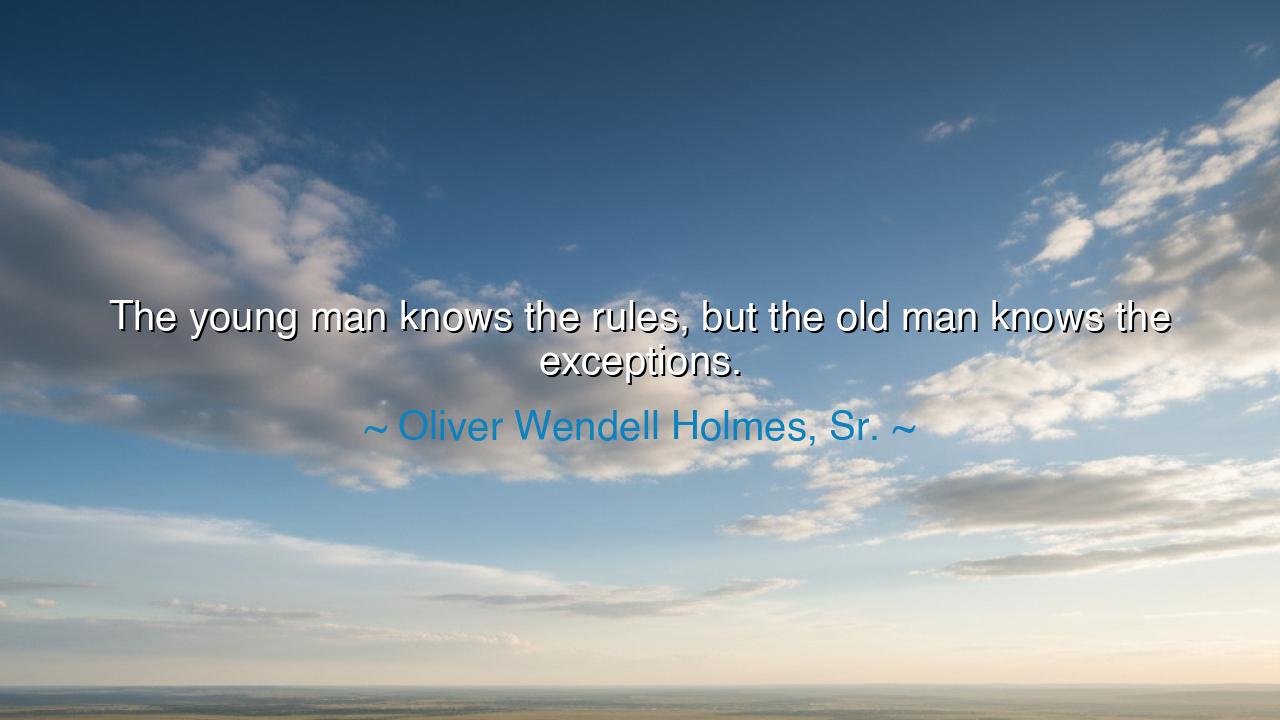
The young man knows the rules, but the old man knows the






Hearken, children of the ages, and behold the words of Oliver Wendell Holmes, Sr.: “The young man knows the rules, but the old man knows the exceptions.” In this utterance lies the timeless wisdom of experience over mere learning, of discernment that arises not from study alone but from the trials and intricacies of life. The rules, clear and rigid, guide the youthful heart, yet the world is vast, and the exceptions, subtle and unexpected, reveal themselves only to those who have walked its winding paths and endured its unforeseen turns.
The origin of this teaching springs from Holmes’ life as a physician, writer, and thinker in 19th-century America, where the balance of knowledge and experience shaped both practice and philosophy. He observed that youth often grasps laws, doctrines, and precepts, but it is age that uncovers the nuances, anomalies, and exceptions hidden in the weave of human affairs. Holmes reminds us that wisdom is not mere obedience to rules, but the art of navigating complexity with understanding and judgment.
Consider the story of Abraham Lincoln, who as a young lawyer studied the laws with care, mastering the statutes of Illinois. Yet it was through years of practice, debate, and exposure to human frailty that he discerned the exceptions—the shades of justice, mercy, and circumstance that no rule alone could capture. In his presidency, guiding a nation torn by civil war, Lincoln exemplified Holmes’ maxim: knowledge of rules is insufficient; insight arises from knowing when the exceptions demand action, compassion, or courage.
Even in the realm of war and strategy, this truth is revealed. Generals may memorize the tactics and formations of armies, yet the battle often defies expectation. Consider Alexander the Great, whose genius lay not only in learning the strategies of his predecessors, but in perceiving the exceptions of terrain, morale, and timing, adapting the rules to meet the moment. The young may follow doctrine; the experienced bend it wisely.
In daily life, this wisdom endures. Parents, elders, and teachers guide with rules, yet the unexpected challenges of human character and circumstance reveal themselves only with age. The seasoned soul knows when to adhere, when to bend, and when to act beyond the confines of prescribed law, transforming knowledge into the living art of prudence and judgment.
Therefore, children of future generations, heed the counsel of Holmes: embrace the rules, for they are the foundation, but honor the exceptions, for they are the treasures of experience. The young learn well, but the old, through trials endured and hearts tested, possess a wisdom that navigates the subtle currents and hidden truths of the world. In this balance lies the eternal mastery of life.






DBKiet Dang Ba
Personally, I want a playbook for maturing judgment. Early career me clung to protocols; later, mentors showed how to read context, then document and repay the debt by improving the rule. My current heuristic: break glass only if three tests pass—no hidden harm, full transparency afterward, and quick reversibility. Then propose a rule update within a week. What’s yours? Closed question: when repeated exceptions expose a pattern, should we sunset the original policy by default unless a public case restores it?
NCnguyen chi
Some domains punish improvisation. In aviation, medicine, and nuclear operations, a cavalier “edge case” can cascade into catastrophe. So the task is to separate adaptive expertise from unsafe creativity. What training embeds that boundary—simulation of rare events, error budgets, and stop-the-line authority for anyone who smells danger? I’m curious about a two-tier approach: strict rules for irreversible, high-blast-radius moves; guided discretion for reversible, low-risk ones. Open question: would you endorse a visible “decision ladder” that maps required approvals as risk rises?
Ppham
Part of me bristles, because talk of “exceptions” can mask privilege. Who actually gets leeway—the well connected, the charismatic, or everyone? If rule flexibility distributes unevenly, it’s not wisdom; it’s favoritism. What safeguards keep judgment from drifting into bias—peer review of discretionary calls, transparency logs, rotating oversight, and audits for disparate impact? I want practical fairness tests: would I defend this decision if identities were swapped, and can a reasonable outsider reproduce the rationale? Closed question: should exception decisions be time-limited and automatically re-evaluated by someone uninvolved?
NNNhu Ngo
As a reader, I hear a lesson about the gap between manuals and reality. Checklists give us safety; context gives us judgment. The challenge is transmitting that context without sliding into “anything goes.” How do you teach discernment to newcomers—shadowing, red-team critiques of case studies, or a “why behind the rule” primer? I’d love a mentorship ritual: when veterans break form, they annotate the decision with risks, alternatives, and a note to escalate next time. Closed question: should orgs require a short after-action note any time someone intentionally deviates from procedure?